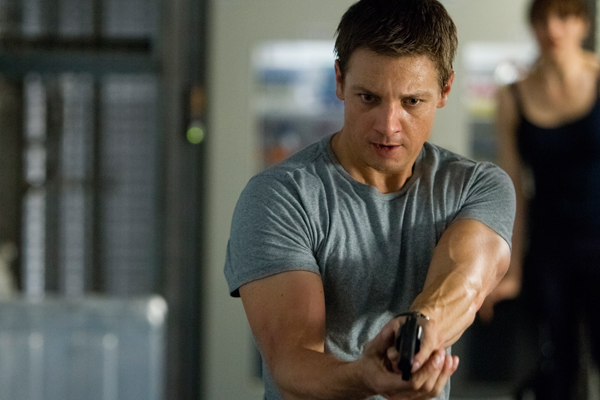Seriously, what has Hollywood got against wolves at the moment? First there was last year’s The Grey, which saw a bearded Liam Neeson stalked across Alaska by a pack of the beasts before using his survival skills — and some broken bottles — to smash them on to the endangered species list. Now we have The Bourne Legacy, which starts with a bearded Jeremy Renner being stalked across Alaska by a pack of the beasts before using his survival skills to, etc., etc. It’s very similar, except Renner doesn’t have broken bottles at his disposal. He has military drones.
It would be wrong to dwell on this lupicide, however. This is a Bourne film — following on from the trilogy starring Matt Damon as the secret-agent-with-awesome-reflexes Jason Bourne — and so, unlike The Grey, it soon leaves Alaska behind to stack up some air miles and answer the tantalising questions established in its prologue. Who is this man that can best the wild? What was he doing there in the first place? Why does he keep gobbling down pills? And why does he insist on calling those pills chems, like some teenager trying to sound cool?
The first of these questions is answered in short order: our hero is not Jason Bourne from the earlier films, but another agent who walks the thin line between uncaring killing machine and decent guy. And as for his other secrets… well, they are unmasked within the first half of the movie too. It turns out that this chap, Aaron Cross, used to be called Kenneth Kitsom until he was declared KIA in Iraq and inducted into an off-the-radar programme to create Jason Bourne-a-likes for Uncle Sam. The pills he takes are to keep his brain and brawn in enhanced condition. He’s running out of them because his makers have decided to kill him.
This is very different from the previous Bourne films, which used their hero’s amnesia as a dramatic tool, slowly piecing together his consciousness and ours with it. Nothing has been forgotten here, which makes Aaron Cross more like James Bond — a known quantity. And while this may be how many films work, especially those without amnesiac lead characters, it does detract from The Bourne Legacy. With the film-makers hurrying everything out into the open relatively early on, they forget to include surprises for later.
For instance, consider Cross’s goal, which we discover about halfway through the movie: to do away with the pills he’s become hooked on, by being injected with a special virus in a laboratory. I don’t think it’s ruining anything to say that he pulls it off, but he does so about a full half-hour before the film finishes. And how does director–writer Tony Gilroy then fill those 30 unforgiving minutes? With a chase scene so elongated that it threatens to spill out of the projector. Cross and his scientist helper (Rachel Weisz) skid around on foot, by motorbike and across roofs, yet there’s nowhere really for them to go. It’s strange.
And this is a particular waste because The Bourne Legacy has a great set-up. From the moment Cross first snuffles up those pills on a frozen mountainside, I was expecting Man With the Golden Arm-style scenes of overdose, underdose, sweaty comedown, collapse and madness — but none of that ever really happens. Instead, Renner sometimes acts a little woozy, for about ten seconds. The film would prefer to move on to yet another scene with shady politicians and intelligence operatives barking lines such as ‘Get me to the situation room, dammit!’ or ‘You can’t handle the truth!’ or whatever. I tuned out in those parts.
Oh, perhaps this review is starting to sound too grouchy about The Bourne Legacy. The truth is it’s more peculiar than bad. And it has a lot to commend it otherwise. The action set-pieces are fast, suspenseful and imaginative. The acting is excellent, particularly from Rachel Weisz who brings almost all of the intensity that she cultivated in Terence Davies’s The Deep Blue Sea last year. And there is one scene that captures murder — proper murder, not the usual ‘bang, bang, you’re dead’ — more powerfully than almost any big Hollywood film since David Fincher’s Zodiac (2007).
Still, this is not what we came for. We came for Bourne Mark II; this feels more like a prototype. When it ends, you sense that there are another couple of films to come, in service of developing a proper character arc for Aaron Cross. But we shouldn’t allow that to be used as an excuse for this film’s weaknesses. After all, it’s not one that Jason Bourne ever needed.






Comments